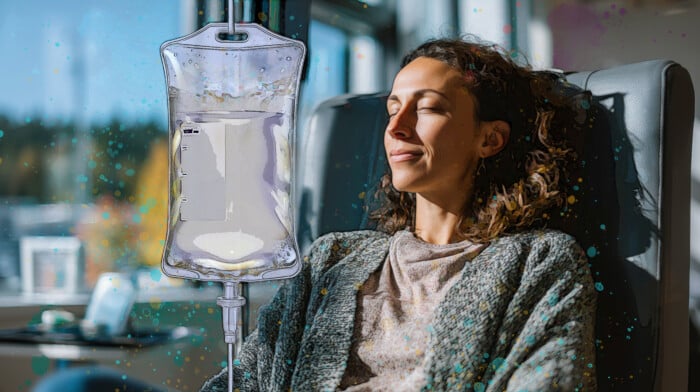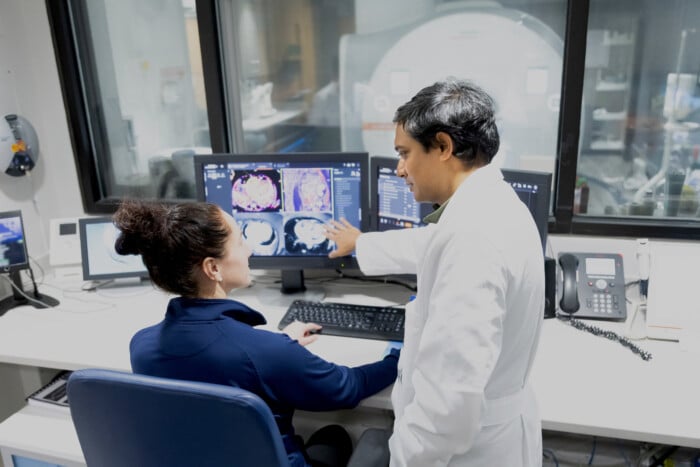Healthwise: Taking a Holistic View
Dr. Bert Mathieson brings holistic healing to NH

When patients walk into NH Natural Health Clinic in Bedford, many have already seen five or more specialists. They’ve tried medications, undergone tests and endured years of symptoms, yet they’re still searching for answers.
That’s where Dr. Bert Mathieson, a licensed naturopathic doctor, can help by looking at their illnesses or injuries in a different way. Patients treated at his office can expect a multipronged approach to diagnosis and treatment, which could include nutritional counseling, acupuncture and botanical medicine.
“We take a holistic view,” he says. “We ask, ‘What can we do here?’ Often that means going back to basics — looking at diet, sleep, stress and lifestyle — and building a path toward healing from the ground up.”
Mathieson’s own path to naturopathic medicine began after years of working as a dietitian in Los Angeles. When he learned about the field, he headed to Arizona for four years of naturopathic medical school. He now runs his Bedford-based practice with two other naturopathic doctors and his sister, Kristi Mathieson, a registered dietitian. Together, they’ve created a family business rooted in education and natural healing.
Many people are unaware of naturopaths and how they fit into the larger health care picture. In addition to learning anatomy and pharmacology like conventional doctors, naturopathic doctors train extensively in nutrition, botanical medicine, homeopathy, Chinese medicine and hands-on therapies like spinal manipulation. Mathieson says they actually spend more time in the classroom than medical doctors.
“We’re the only primary care-trained doctors in the U.S. whose education is integrative from day one,” Mathieson says.
At his clinic, Mathieson most often focuses on treating Lyme disease, cancer and diabetes. He often collaborates with oncologists and other specialists to determine the best course of treatment for his patients. Unlike primary care providers who can see up to 16 patients a day, naturopathic doctors often spend up to an
hour with patients to find the root cause of their illnesses.
While they’re trained and licensed as primary care providers, the health care system hasn’t fully recognized them as such. In New Hampshire, some insurance companies still label naturopaths as specialists, which can create challenges for patients looking for referrals or insurance coverage. Even so, Mathieson sees progress.
“Ever since 2020, we’ve seen a shift,” he says. “Patients are more interested in seeing multiple providers and working collaboratively. And that’s where we shine — we love collaborating with oncologists, physical therapists and primary care doctors.”
A member of the New Hampshire Association of Naturopathic Doctors, he worked with legislators in the state to get private insurance companies to cover naturopathic doctors. However, naturopathic doctors are not yet covered by Medicare or Medicaid in New Hampshire. Medicare does cover certain services that may overlap with naturopathic care, such as acupuncture and chiropractic care, but only when performed by recognized providers. Some Medicare Advantage (Part C) plans may offer limited coverage for alternative therapies, but coverage for naturopathic services is rare and varies by plan.
What to Look For in a Naturopath
Patients often seek out naturopathic doctors when they’re looking for alternatives to pharmaceuticals or hoping to reduce the side effects of medicines. For example, a person with Type 2 diabetes might seek out Mathieson to explore natural ways to lower their A1C. The disease can be reversed in its early stages if patients are willing to change their lifestyle, he says.
Mathieson works with them to help them develop good eating habits, increase activity levels or reduce stress. He asks patients if they are getting enough sleep or have been exposed to any toxins. In a traditional provider’s office, a patient might be seen quickly and initially be offered a prescription.
“I always look at three legs of the stool — diet, activity, and supplements or medications,” Mathieson says. “It’s not about judgment. It’s about empowering people to take control of their health.”
Cancer patients undergoing radiation and chemotherapy can benefit from naturopathic therapies such as vitamin IVs that can complement their existing protocols.
“There’s a lot of studies on some of these therapeutics and what decrease fuel for cancer cells or the proliferation of angiogenesis,” he says.
Angiogenesis refers to the way the body makes new blood vessels. It’s something your body does naturally, like when you’re growing, healing from a cut or building up tissue. However, when someone has cancer, a tumor can “trick” the body into growing extra blood vessels just to feed it. Those new vessels bring the tumor more oxygen and nutrients, helping it grow bigger and faster.
Healing requires more than medicine. Reducing stress is key to recovery and often overlooked by providers and patients, Mathieson says.
“Most people that walk through the door, that’s a huge obstacle to their healing. Different things might help them, for example cranial sacral therapy or acupuncture, or meditation or prayer,” he says. “Anything that the person resonates with to help them at that level. Because a lot of us heal from the top down.”
So, how do you find the right naturopathic doctor for your needs?
“Look for someone whose specialty aligns with your concerns,” Mathieson says. “Some of us focus more on acupuncture, others on botanical medicine. But we all share the same core philosophy: Support the body’s ability to heal itself.”
For patients overwhelmed by chronic illness or frustrated by the health care system, naturopathic doctors can offer a healing alternative.
What Is a Naturopathic Doctor?
Not all providers with the term “naturopath” in their credentials can practice in the same way. For example, naturopaths and naturopathic doctors (ND) have different levels of education, training and licensure. Licensed naturopathic doctors can diagnose and treat patients, distinguishing them from traditional naturopaths.
A “naturopathic physician” refers to a Doctor of Naturopathy (N.D.) or Doctor of Naturopathic Medicine (N.M.D.). Naturopathic physicians must attend a four-year graduate program at one of the North American naturopathic medical schools accredited by the Council on Naturopathic Medical Education, according to the American Association of Naturopathic Physicians.
In the 26 states with licensing requirements, naturopathic physicians must graduate from naturopathic medical college and pass national board exams to receive a license. Licensed naturopaths must also complete any state-mandated continuing education requirements. The New Hampshire Naturopathic Board of Examiners, under the Office of Professional Licensure and Certification, oversees the licensing and practice of naturopathic medicine in the state.
For more information, or to verify a naturopathic doctor’s license in New Hampshire, you can visit the New Hampshire Office of Professional Licensure and Certification.













